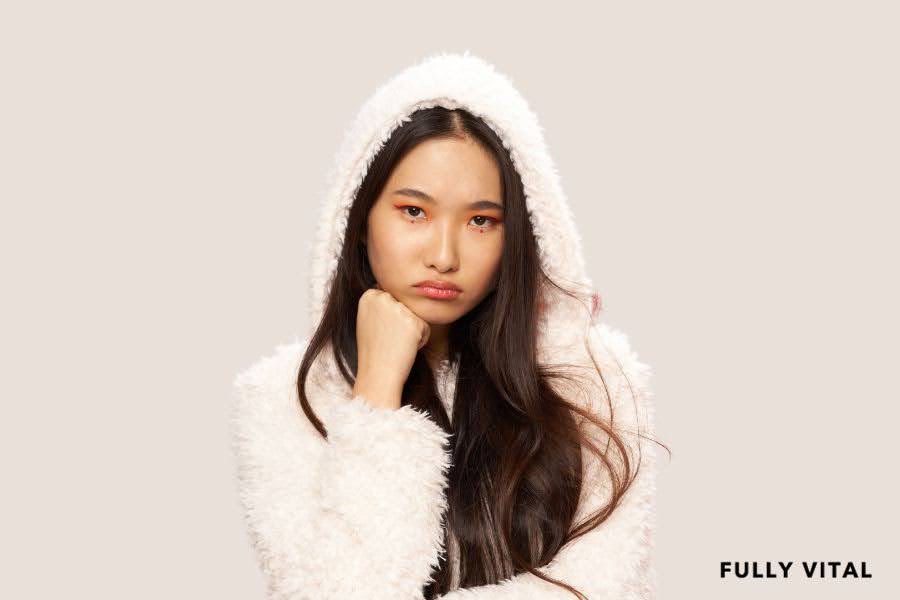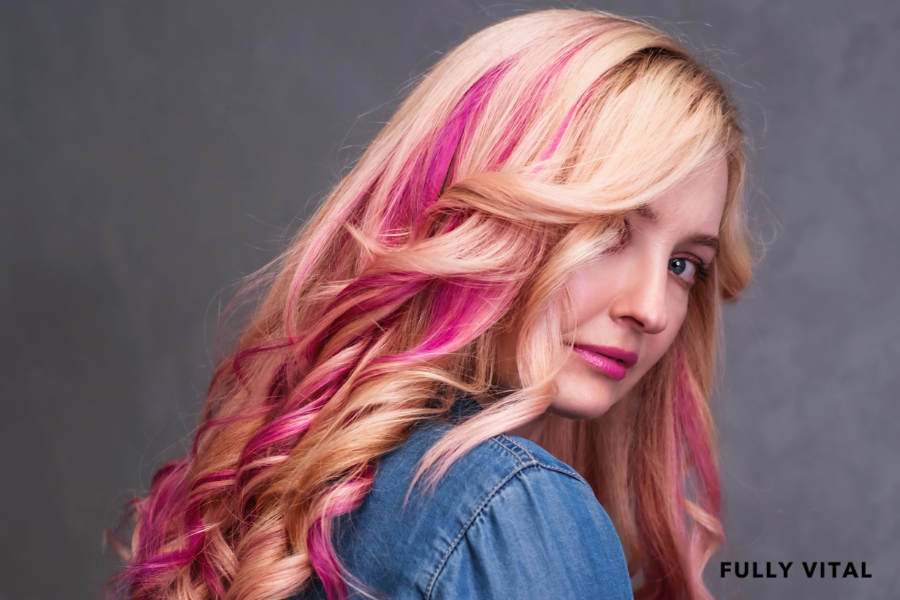
Say Goodbye To Dryness: Best Shampoos For Dry Hair Revealed
When it comes to dry hair, the struggle is real.
Dry strands lack luster, often looking lifeless and feeling brittle to the touch.
And while genetics play a role, external factors like heat styling, environmental conditions, and even your washing routine can exacerbate the situation.
This is why empowering yourself with the right shampoo, filled with nurturing ingredients and devoid of harsh chemicals, is crucial.
Here, we'll dive into the best practices, ingredients, and caring tips for all of you managing dry hair complexities.
Combat dry hair with knowledge and nurture.
Discover FullyVital's range of hair growth products that promote moisture and vitality without undue stress on your strands.

I LOVE MY HAIR NOW
FullyVital hair serum and hair vitamins made tremendous improvements in my hair. I truly love my hair now.
Shop Hair ProductsUnderstanding Dry Hair
Dry hair happens when your strands don't get or retain enough moisture, leading to a brittle, dull look.
This can stem from overusing heat tools, exposure to harsh environmental conditions, scalp issues, and even health complications.
Excessive washing can also strip your hair of its natural oils, essential for its well-being.
As you age, your hair's ability to hold moisture can diminish, making it even more susceptible to dryness.
Understanding these causes is the first step toward tailoring your hair care routine for optimal moisture preservation.
Signs Your Hair Is Dry
The symptoms of dry hair are usually unmistakable.
Your hair may feel rough to the touch, have a dull sheen, tangle easily, and be difficult to style.
It's often accompanied by split ends and frizz, signs that your hair's moisture balance is out of whack.
Noticing these symptoms early can be pivotal in preventing further damage.
Moreover, if your scalp feels tight or itchy, it could also be a sign that it's not providing enough moisture to your hair.
Key Ingredients For Dry Hair
Dry hair can be caused by various factors, including genetics, environmental factors, and hair care practices.
To effectively address dry hair, it's important to use hair care products that contain key ingredients designed to hydrate, nourish, and protect your hair.
Moisturizing Agents
Invest in shampoos enriched with moisturizing agents like glycerin, which is a humectant that pulls moisture from the air into your hair.
Aloe vera is another power-player that soothes the scalp and hydrates your strands.
Panthenol, or Pro-Vitamin B5, works by retaining moisture in the hair and improving its texture and elasticity.
These agents can transform your dry, brittle hair into more supple and manageable tresses.
It's these ingredients that can make the difference between dryness and hydration.
Proteins And Their Role
Proteins are the building blocks of your hair, critical for its strength and repair.
Ingredients such as keratin, which is the natural protein in your hair, can replenish and reinforce your hair's structure when it's damaged.
Wheat proteins and silk amino acids can also penetrate the hair shaft, offering hydration and repair.
Using a shampoo with these proteins can help maintain the proper moisture balance.
They provide essential nutrients to your hair, aiding in restoring its natural luster and bounce.
Natural Oils For Hydration
Natural oils play an invaluable role in maintaining your hair's moisture.
Look for shampoos featuring oils like argan, coconut, and jojoba as they can deeply condition and prevent moisture loss.
Argan oil is particularly beneficial for adding shine and reducing frizz.
Coconut oil is known for its ability to penetrate the hair shaft and provide deep hydration.
Jojoba oil closely mimics the scalp's natural oils, making it an effective moisturizer.
Integrating these oils into your hair care can offer a much-needed hydration boost to your parched locks.
Choosing The Right Shampoo
Choosing the right shampoo is important for maintaining the health and appearance of your hair.
The best shampoo for you depends on your hair type, specific needs, and any concerns you may have.
What To Look For On The Label
Scanning shampoo labels can be overwhelming, but it's important to know what to look for.
Ingredients that promise to moisturize, repair, and protect should be at the top of your list.
Stay clear of long chemical names and instead, search for recognizable ones like the aforementioned glycerin and natural oils.
Avoid shampoos with high alcohol content and look for formulations tailored to dry or damaged hair.
A good shampoo should cleanse your scalp while also providing necessary hydration to your hair.
Sulfates And Parabens: What You Need To Know
Sulfates are detergents that can strip hair of its natural oils, and parabens are preservatives that can cause scalp irritation.
While they make shampoos lather beautifully, they're not always hair-friendly.
If you have dry hair, consider sulfate-free and paraben-free shampoos to avoid unwanted dehydration and irritation.
Not all shampoos that are labeled "sulfate-free" are entirely free of harsh detergents, so make sure to read the ingredients list thoroughly.
Opt for gentler, more natural alternatives that clean without causing further dryness.
Balancing Ph For Scalp Health
The pH of your shampoo can affect the health of both your hair and scalp.
A balanced pH level for scalp health is slightly acidic, usually around 5.5.
Shampoos with a similar pH can help maintain the scalp's natural barrier, minimizing dryness and irritation.
When the pH level is too high or too low, it can disrupt this barrier, exacerbating dryness and other scalp issues.
Choose a shampoo that specifically states it's pH-balanced for optimal hair health.

Shampooing Techniques For Dry Hair
If you have dry hair, it's important to be mindful of your shampooing techniques to prevent further damage and maintain the moisture balance in your hair.
Frequency Of Washing
Finding the right washing frequency is key for managing dry hair.
Squeaky clean isn't always the best, as too much washing can further strip your hair of essential oils.
For most people with dry hair, shampooing two to three times a week is sufficient.
However, your lifestyle, activity level, and hair type may require adjustments to this routine.
Remember, it's about maintaining cleanliness while optimizing moisture, so tailor your washing schedule to achieve that balance.
Water Temperature And Hair Health
Water temperature plays an underrated role in the health of your hair.
Hot water can accelerate dehydration in your strands and irritate your scalp, resulting in flakiness and further dryness.
Aim for lukewarm water which is effective enough to cleanse without stripping away needed moisture.
A cooler rinse at the end of your shower can help seal in the conditioner, leaving your hair smooth and shiny.
Consistent use of lukewarm water can prevent exacerbating dryness and keep your hair healthy.
Applying Shampoo Effectively
The application of shampoo requires a careful approach, especially for dry hair.
Focus on lathering the shampoo at the scalp, as that's where oil buildup tends to occur.
Avoid piling all your hair on top of your head and scrubbing vigorously, as this can cause tangles and breakage.
Gently massage the scalp with your fingertips to stimulate circulation and aid in cleaning.
When rinsing out the shampoo, let it flow through the lengths of your hair, which will be sufficient to clean them without causing dryness.
Avoiding Common Mistakes
Avoiding common mistakes is essential to maintain the health and appearance of your hair.
Over-Washing And Its Effects
Over-washing your hair can be detrimental, especially for those with dry hair.
When you wash too frequently, the scalp's natural oil production ramp up, which might seem contradictory when combating dryness.
However, in reality, this can result in an oily scalp and even drier hair ends as the oil doesn't always distribute evenly.
Monitor your hair's response to washing frequencies and adjust accordingly.
Sometimes, less is more when it comes to maintaining the natural balance of oils in your hair.
Harmful Ingredients To Avoid
Certain ingredients found in hair care products can be especially harmful to dry hair.
Beware of alcohols like SD alcohol, denatured alcohol, isopropyl alcohol, and ethanol which can be drying.
Also, look out for unnecessary fillers, fragrances, and harsh preservatives that offer no benefits to hair health.
Instead, opt for shampoos with beneficial ingredients like those discussed earlier.
Making informed choices about what you apply to your hair can prevent further dryness and damage.
The Myth Of 'more Is Better'
More isn't always better when it comes to shampoo.
Using a hefty amount might feel like it's cleaning better, but it can actually lead to buildup and increased dryness.
A quarter-sized dollop of shampoo is usually enough to effectively cleanse the scalp and hair.
Ensure that you're rinsing thoroughly after shampooing to prevent residue which can make your hair look dull and feel dirty quicker.
Conserving your shampoo not only saves you money but also keeps your hair healthier in the long run.
Complementary Haircare Practices
In addition to choosing the right hair care products and avoiding common mistakes, there are several complementary hair care practices you can incorporate into your routine to maintain healthy and beautiful hair.
Conditioning And Dry Hair
Conditioning should be an integral part of your routine if you're dealing with dry hair.
It’s essential after every shampoo to restore moisture and protect the hair from environmental stressors.
Focus the conditioner on the ends where the hair is the oldest and driest, and let it sit for a few minutes to penetrate effectively.
A leave-in conditioner or detangler can also help to further protect and moisturize throughout the day.
Regular conditioning can drastically improve the manageability and appearance of your hair.
Hair Masks And Deep Treatments
Just like your skin, your hair occasionally needs a deep treatment or mask, especially if it's dry.
A weekly hair mask can provide concentrated moisture and nutrients, penetrating deep into the hair shaft to nourish and revitalize.
Look for masks rich in oils and butters like shea or cocoa butter for maximum hydration.
Alternatively, a professional deep conditioning treatment can provide a powerful boost to hair health when at-home treatments aren't enough.
Incorporate this practice into your routine for long-term hair health improvements.
Protecting Hair From Environmental Factors
Environmental factors like the sun, wind, and pollutants can sap moisture from your hair, leaving it even dryer.
Wearing a hat or scarf can physically protect your hair from such elements.
UV-protectant hair products can help shield against sun damage, which is especially important in summer months or if you spend a lot of time outdoors.
Regular trims can also minimize the effects of environmental damage by removing split ends and encouraging healthier hair growth.
Being proactive in protecting your hair can make a significant difference in retaining moisture and preventing breakage.
Diy Shampoo Alternatives
If you're interested in DIY shampoo alternatives, there are several natural and homemade options to consider.
These alternatives are gentle on your hair and often free of harsh chemicals.
However, keep in mind that they may take some time for your hair to adjust to, and the effectiveness can vary depending on your hair type and specific needs.
Natural Ingredients You Can Use
Some prefer a more natural approach to hair care, turning to household items for DIY shampoo alternatives.
Ingredients like honey, which has natural humectant properties, or apple cider vinegar, known for its cleansing and pH-balancing qualities, can be effective.
Aloe vera is another great natural hydrator that can be used in homemade shampoo formulas.
Be mindful of your hair's response to these homemade concoctions, as they can vary significantly.
A patch test is always recommended before applying any new product, even a natural one, to your entire head of hair.
Recipes For Homemade Shampoos
Creating homemade shampoos can be a fun way to take control of what goes into your hair care products.
For example, a shampoo made from coconut milk and aloe vera can be gentle and hydrating for dry hair.
A mix of Castile soap with essential oils can provide a personalized cleansing experience.
It's also possible to create a dry shampoo for those in-between days using arrowroot or cornstarch.
Although homemade shampoos can be beneficial, they should be used with caution, and it's important to research and accurately measure ingredients to avoid adverse reactions.
When To See A Professional
While DIY hair care methods and home remedies can be effective for many common hair concerns, there are certain situations when it's crucial to see a professional hairstylist or a dermatologist for expert advice and treatment.
Persistent Dryness
If your dry hair persists despite your best home care efforts, it's time to see a professional.
Trichologists and dermatologists specialize in hair and scalp health and can provide advice tailored to your unique needs.
They might suggest treatments like scalp therapies, hair analysis, or specific product recommendations.
It's important not to wait too long before seeking professional help, as prolonged dryness can lead to more serious hair problems.
Trusting your concerns to a professional can ensure that you receive the most effective care.
Hair Analysis And Tailored Solutions
When over-the-counter products don't seem to help, a professional hair analysis can be worth the investment.
Specialized professionals can assess the state of your hair down to its cuticle health and recommend products or treatments specific to your hair type and condition.
They may also suggest lifestyle and dietary changes that could improve your hair's condition.
The solutions provided can be much more effective than general advice, as they're based on thorough evaluation and understanding of your particular hair concerns.

Discover The Power Of Fully Vital Hair Growth ProductsAt Fully Vital, we are committed to providing you with the best hair growth products to help you maintain healthy and vibrant locks. Our products offer a range of key features and benefits that can help you combat the natural aging process of your hair and promote regrowth. Here are some of the key features and benefits you can expect from our Fully Vital hair growth products:
Experience the benefits of Fully Vital hair growth products and embrace a healthy relationship with your locks. |
Final Thoughts On Best Shampoo For Dry Hair
Tending to dry hair doesn't have to be a difficult or overwhelming task.
By understanding the causes behind dry hair, choosing the right ingredients in your shampoo, and implementing effective washing and conditioning techniques, you can reinstate the hydration your hair so desperately needs.
Remember that protecting your hair from environmental damage is just as important as selecting the right products.
And when home remedies aren't enough, don't hesitate to seek professional guidance for more persistent issues.
With these thoughtful strategies, waving goodbye to dryness is within your grasp.
Don't let dry hair dampen your spirit.
Explore our collection of hair growth solutions at FullyVital, thoughtfully crafted to infuse life back into every follicle.
Check out our recent blogs:
- Achieve Gorgeous Hair Naturally: Batana Oil's Beauty Secrets
- Best Hair Trends This 2024
- The Waiting Game: When Does Biotin Start Working?
Frequently Asked Questions About Best Shampoo For Dry Hair
What causes dry hair?
Dry hair can result from genetics, environmental damage, over-styling, and harsh haircare products.1
What are the signs of dry hair?
Look for rough texture, dullness, increased breakage, brittleness, and frizz.2
What ingredients should I look for in a shampoo for dry hair?
Seek out moisturizing agents like glycerin, aloe vera, panthenol, proteins like keratin, and natural oils such as argan, coconut, and jojoba.3
How often should I wash my dry hair?
Reduce washing frequency to prevent stripping hair of its natural oils—typically 2-3 times a week is adequate.4
Can hot water affect my dry hair?
Yes, hot water can lead to more dryness.
Use lukewarm water instead to protect your hair's natural oils.5
Are sulfates and parabens bad for dry hair?
Sulfates can strip natural oils and parabens may cause irritation, so products without these may be gentler on dry hair.6
What common mistakes should I avoid for maintaining my dry hair?
Avoid over-washing, using harsh chemicals, and applying too much product which can all contribute to dryness.7
How can I protect my hair from environmental damage?
Use hats to shield from the sun, minimize exposure to wind and cold, and use protective hair products.8
Can I make my own shampoo for dry hair?
Yes, using natural ingredients like honey, eggs, and apple cider vinegar can be gentle alternatives to store-bought shampoos.9
When should I see a professional about my dry hair?
If dryness persists despite your best efforts, seek a professional's expertise for tailored treatments and advice.10
Sources:
- McMillen, M. (n.d.). Dry hair: Causes, treatments, and diagnosis. Healthline. Retrieved from https://www.healthline.com/health/dry-hair
- Abramite, A. (2024). The 17 best shampoos and conditioners for dry hair of 2024. Byrdie. Retrieved from https://www.byrdie.com/best-shampoos-and-conditioners-for-dry-hair-4159387
- Khetarpal, S. (n.d.). Here's how often you should wash your hair. Cleveland Clinic Health Essentials. Retrieved from https://health.clevelandclinic.org/the-dirty-truth-about-washing-your-hair
- (n.d.). Is hot water bad for your hair? (7 disastrous effects). Loving Kinky Curls. Retrieved from https://lovingkinkycurls.com/is-hot-water-bad-for-your-hair/
- (2024). The top hair-care trends of 2024 prove we're all obsessed with hair health. Allure. Retrieved from https://www.allure.com/story/2024-haircare-trends
- (2024). January 2024 haircut calendar: Days to skip at the salon. MSN. Retrieved from https://www.msn.com/en-us/health/other/january-2024-haircut-calendar-days-to-skip-at-the-salon/ar-AA1mekEg
- (n.d.). How to protect hair from environmental problems. Hair's Health. Retrieved from https://hairshealth.com/environmental-factors-affecting-hair-loss-preventative/
- Macneal, R. (n.d.). 5 DIY dry shampoo recipes for every hair color. Good Housekeeping. Retrieved from https://www.goodhousekeeping.com/beauty/hair/g35215439/diy-dry-shampoo-recipes/
- Clayton, R. (n.d.). 6 outdated hair trends you need to leave behind for 2024. Woman & Home. Retrieved from https://www.womanandhome.com/beauty/hair/outdated-hair-trends/
- Shiloah, E. (n.d.). 10 Shampoo recipes you can make at home. Instructables. Retrieved from https://www.instructables.com/Homemade-Shampoo/








